 While there were elements of this episode that made me get behind Shingeki no Kyoujin in a way I haven’t for quite a long time, my willingness to be sucked in is tempered by the knowledge that the TV series is going to end on a cliffhanger. I’m not going to pay to see Attack on Titan in a theatre (certainly not in a pandemic, though I probably wouldn’t anyway). Since there’s basically zero chance I won’t be spoiled by the time I see the finale, whatever impact the ending might have on me will be largely dulled. That being the case, it’s a lot harder to buy in.
While there were elements of this episode that made me get behind Shingeki no Kyoujin in a way I haven’t for quite a long time, my willingness to be sucked in is tempered by the knowledge that the TV series is going to end on a cliffhanger. I’m not going to pay to see Attack on Titan in a theatre (certainly not in a pandemic, though I probably wouldn’t anyway). Since there’s basically zero chance I won’t be spoiled by the time I see the finale, whatever impact the ending might have on me will be largely dulled. That being the case, it’s a lot harder to buy in.
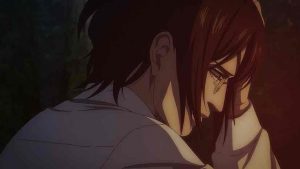 Mind you there have been long stretches where I didn’t care enough for it to matter – so I guess this is progress. Things didn’t start off on a great footing – Hange I can take or leave, but Levi… Oh, well – it was nice having a break from him, anyway. Levi is pretty much helpless and Hange is pretty far out of the loop, but they’re going to factor into what happens from here. The main events are happening back in Trost, where the vile opportunist Floch is busy cementing his hold on the rabble. Seeing the Eldians in this light unfortunately plays into the false equivalency which is a by-product of the historical allegories Isayama has chosen to write. But there’s no other way for him to move the story forward from here.
Mind you there have been long stretches where I didn’t care enough for it to matter – so I guess this is progress. Things didn’t start off on a great footing – Hange I can take or leave, but Levi… Oh, well – it was nice having a break from him, anyway. Levi is pretty much helpless and Hange is pretty far out of the loop, but they’re going to factor into what happens from here. The main events are happening back in Trost, where the vile opportunist Floch is busy cementing his hold on the rabble. Seeing the Eldians in this light unfortunately plays into the false equivalency which is a by-product of the historical allegories Isayama has chosen to write. But there’s no other way for him to move the story forward from here.
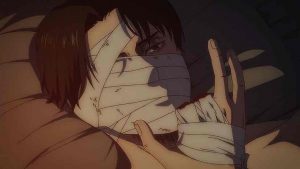 I couldn’t possibly care less about Levi’s plan to team up with his enemies to kill Zeke, which seems wholly driven by revenge and/or his Ackerman genes. Hopefully Hange at least is casting her net wider than that. As Armin and Gabi pursue Conny and Falco, Floch is preparing to execute Yelena (another one I could care less about) and Onyankopon. One wants to think better of Jean and Conny than this – and while Jean’s actions will eventually make is easier to do that, with Conny it’s more complicated. I don’t give him any credit for feeling guilty about what he’s about to do – he knows damn well how evil it is.
I couldn’t possibly care less about Levi’s plan to team up with his enemies to kill Zeke, which seems wholly driven by revenge and/or his Ackerman genes. Hopefully Hange at least is casting her net wider than that. As Armin and Gabi pursue Conny and Falco, Floch is preparing to execute Yelena (another one I could care less about) and Onyankopon. One wants to think better of Jean and Conny than this – and while Jean’s actions will eventually make is easier to do that, with Conny it’s more complicated. I don’t give him any credit for feeling guilty about what he’s about to do – he knows damn well how evil it is.
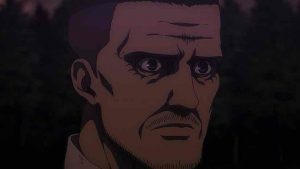 Here’s the thing – there’s absolutely no evidence that Conny wouldn’t have followed through on his plan to feed Falco to mommy if Armin and Gabi hadn’t shown up. His whole transformation afterwards seems way too neat and easy. As for Armin’s plan to feed himself to the mom titan, the less said about that the better (the stupid stick rears its ugly head again). All’s well that ends well I suppose, and Falco is one of the characters in this cast who actually deserves to not have terrible things happen to him.
Here’s the thing – there’s absolutely no evidence that Conny wouldn’t have followed through on his plan to feed Falco to mommy if Armin and Gabi hadn’t shown up. His whole transformation afterwards seems way too neat and easy. As for Armin’s plan to feed himself to the mom titan, the less said about that the better (the stupid stick rears its ugly head again). All’s well that ends well I suppose, and Falco is one of the characters in this cast who actually deserves to not have terrible things happen to him.
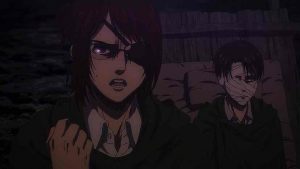 In the end Jean can’t go through with Floch’s vision for the future, much less Eren’s, and this happens in a way that seems far more organic (Jean’s more interesting that Conny anyway, so I guess it makes sense). Because – small world! – Armin and the others run into Annie scarfing pie on their way home, she joins up with them (poor Hitch). There’s no evidence of sparkery between the two A’s, but the night is young – I can always hope. Hange and Levi cut a deal with Pieck and her Marleyan leash-holder, and an eventual plan is hatched to get Jean and Reiner out of Dodge and united with the others. This all happens oddly fast, and mostly offscreen, but I did like where it ended up.
In the end Jean can’t go through with Floch’s vision for the future, much less Eren’s, and this happens in a way that seems far more organic (Jean’s more interesting that Conny anyway, so I guess it makes sense). Because – small world! – Armin and the others run into Annie scarfing pie on their way home, she joins up with them (poor Hitch). There’s no evidence of sparkery between the two A’s, but the night is young – I can always hope. Hange and Levi cut a deal with Pieck and her Marleyan leash-holder, and an eventual plan is hatched to get Jean and Reiner out of Dodge and united with the others. This all happens oddly fast, and mostly offscreen, but I did like where it ended up.
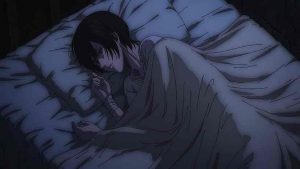 For all that their characters have been diminished by the writing, Armin, Reiner, and Jean are some of the most layered characters in Shingeki no Kyoujin. Seeing them together with Annie, Falco and Gabi (and those other annoying ones) as a ragtag band trying to stop global genocide is a pretty fun development, I gotta say. Most of the characters blessed with a shred of awareness and decency thrown together (however unlikely the circumstances were) to save the world is about as engaging a turn as I could realistically have hoped for as we head into the home stretch. I just wish the finish line was going to be the end of this season.
For all that their characters have been diminished by the writing, Armin, Reiner, and Jean are some of the most layered characters in Shingeki no Kyoujin. Seeing them together with Annie, Falco and Gabi (and those other annoying ones) as a ragtag band trying to stop global genocide is a pretty fun development, I gotta say. Most of the characters blessed with a shred of awareness and decency thrown together (however unlikely the circumstances were) to save the world is about as engaging a turn as I could realistically have hoped for as we head into the home stretch. I just wish the finish line was going to be the end of this season.


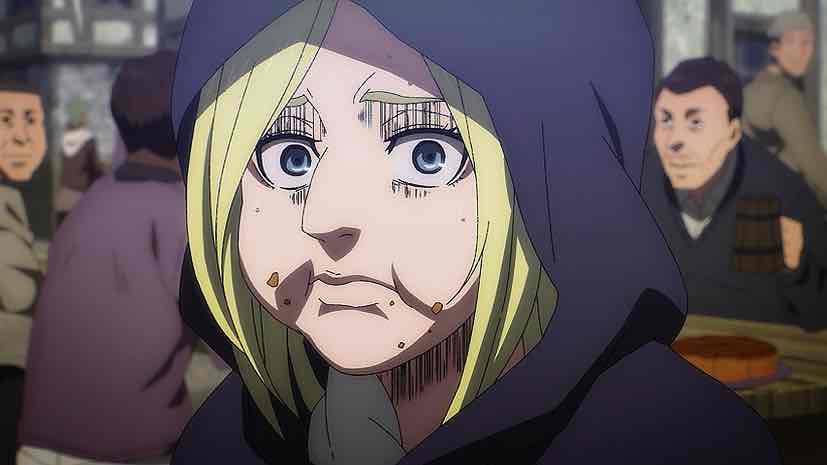
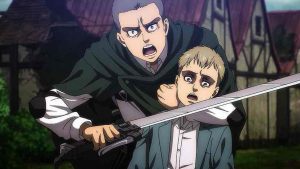
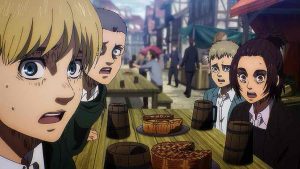
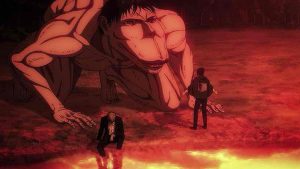
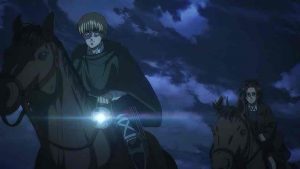
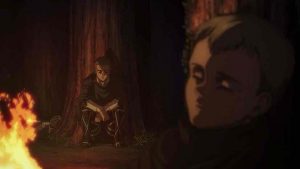
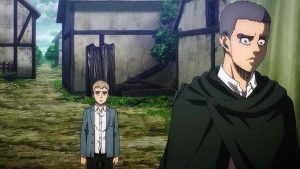
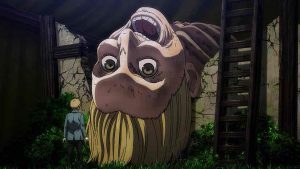
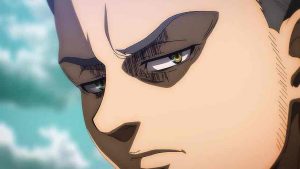
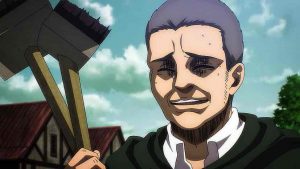
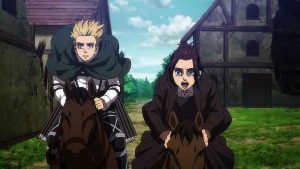
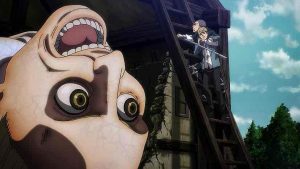
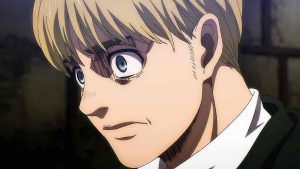
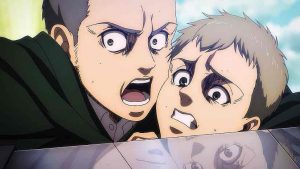
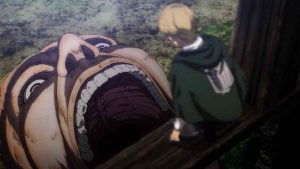
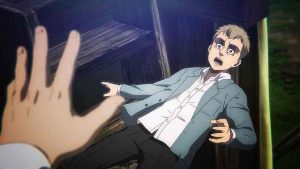
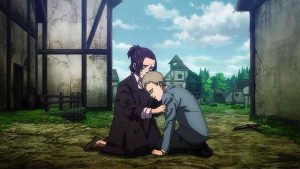
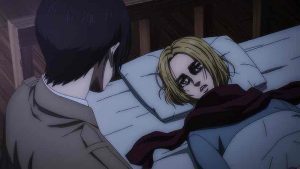
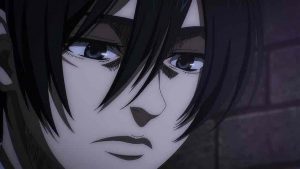
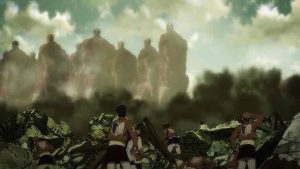
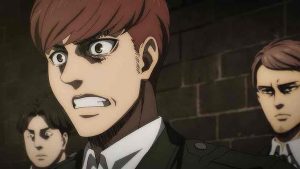
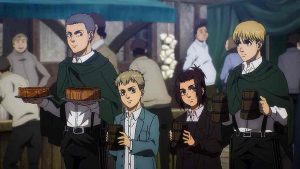
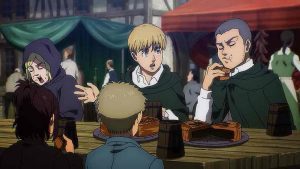
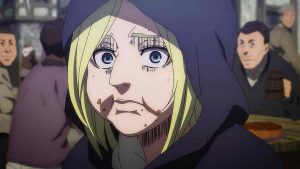
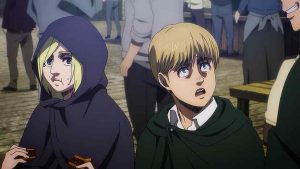
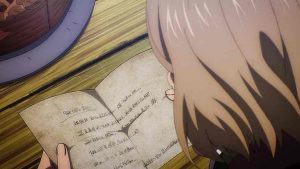
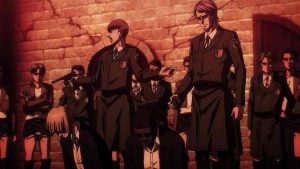
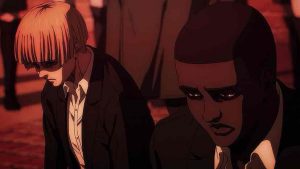
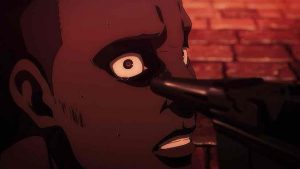
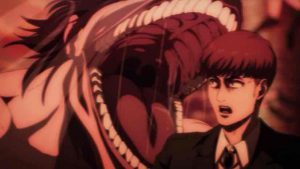
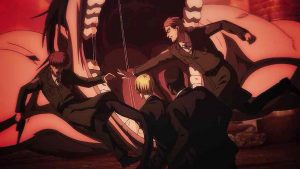
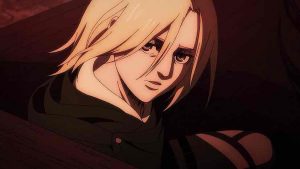
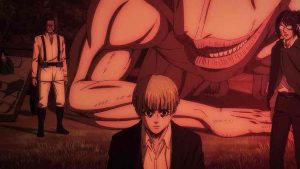
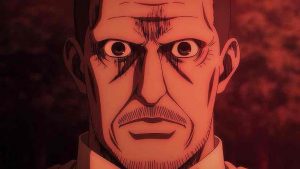
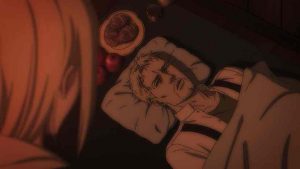
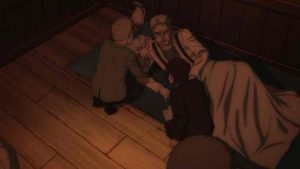
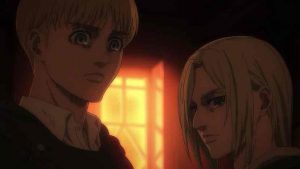
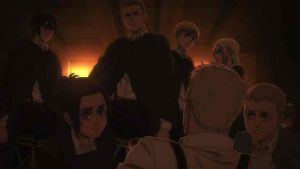
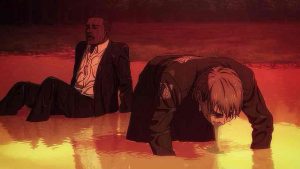
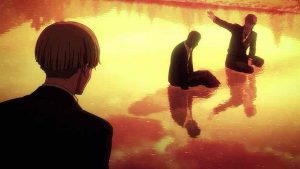
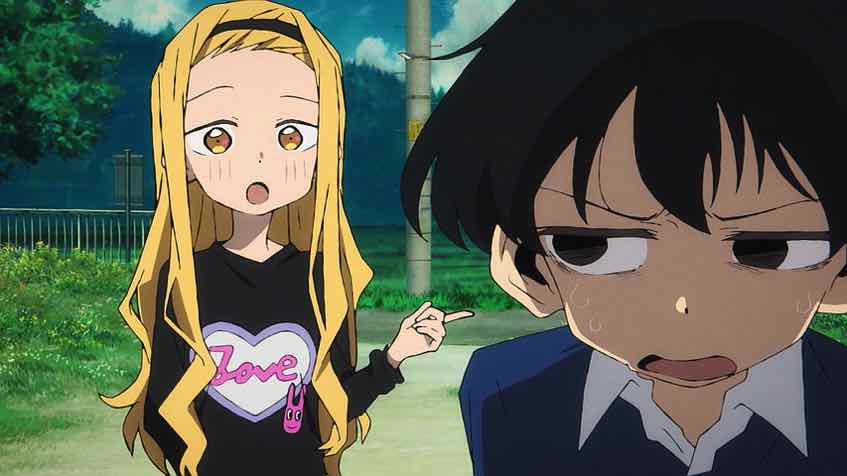
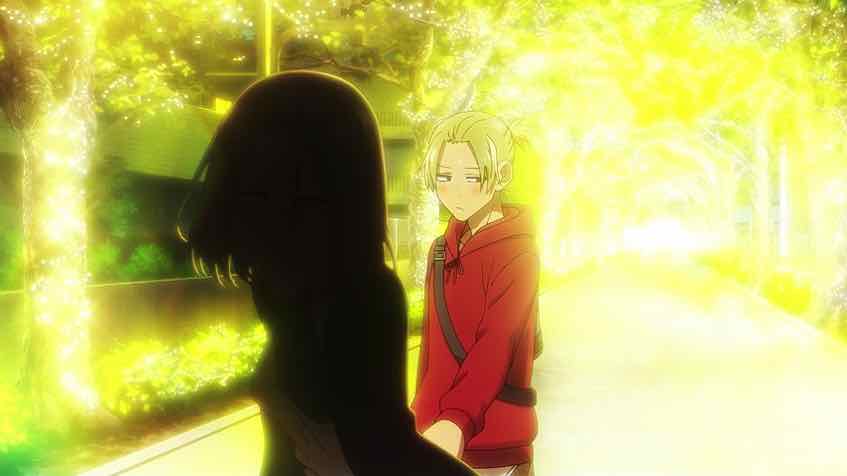
Simone
February 28, 2022 at 9:41 pmMan, this week the “revanchism and thinly veiled metaphor for nuclear annihilation” show sure hits different.
Armin is essentially a kid with enough trauma for ten lifetimes, survivor’s guilt and so many expectations and responsibilities piled up on him it’d be hard to hold them even in his titan form who’s been trying desperately to convince his friend to not do something horrible he’ll regret, and is even more desperate to keep together whatever little thin thread of understanding has formed between his side and Gabi and Falco’s. Calling what he does him being hit with the “stupid stick” sounds to me like you’re the one who’s undermining him, not Isayama. Again, it’s all a matter of perspective. But as the ending makes finally abundantly clear (if it wasn’t already for several episodes now), the end game is now a team of these broken people from all sides overcoming their differences in the name of the nobler cause of saving the world, so honestly, I think it’s pretty blatant that he was never meant to be “weak”.
Mind, when this chapter came out, it did piss off a lot of the manga reader community – the part that interpreted the manga like you do, except they also *agreed* with it, and generally thought Eren was doing nothing wrong. But I think it’s a misinterpretation. Just because the story shows in depth what’s going on inside the heads of its villains doesn’t mean they are heroes. Eren’s motivations are clear and there’s a perfectly logical thread from where he started to now, to the point that it becomes easier to blend in the relatively all right kid he used to be with the psychopathic war criminal he’s become. But every war criminal ever was probably a pretty all right kid too at some point, and that doesn’t excuse them. Overall, I’d say the show isn’t siding with Eren at all, but of course because we’re privy to his and his friends’ perspective it’s never as simple as him being some inhuman monster either.
Guardian Enzo
February 28, 2022 at 11:32 pmIt strikes me that Isayama is trying to have it both ways with Armin on this whole guilt thing. The simple truth is, if Armin were as smart as we’re told he is, he’d realize Erwin was terrible at his job. So if Armin really believes the Erwin stuff Isayama puts in his mouth, he must not be all that brilliant in the first place.
Simone
March 1, 2022 at 12:18 amI mean, there’s the “informed ability” problem of course, but even so, impostor syndrome is a thing. Combined with his peculiar case of survivor’s guilt, I don’t think Armin would ever be the most objective judge of his own value. Seems to me like no one else actually thinks he’s as bad as he thinks of himself. It’s not a matter of intelligence, one can be very smart about certain things and totally clouded by their own emotions about others.
sonicsenryaku
March 1, 2022 at 2:59 amI think that’s a weird rationale to say that Armin must not be smart at all because his in-story intelligence is incapable of figuring out that Erwin’s intelligence when deconstructed, is not of a respectable level. Erwin is written to be seen as a “tactical genius;” meaning that regardless of how smart the cast might be in-story, they will always be written to see Erwin in that way. That’s not a function of the character’s intelligence; that’s a function of Isayama arguably not having the best grasp of genius war tactics, or at the very least, failing to write Erwin in a way that his tactic-saviness would be believable to the audience. That’s a problem outside the text not inside it, Enzo; therefore, measuring Armin’s in-story intelligence by that argument is absolutely invalid. As Simone eloquently put last week, the Erwin “genius tactician” problem is more so a product of writers sometimes not being able to write genuinely convincing genius war tacticians. The more valid criticism here would be that your suspension-of-disbelief is being tested because someone of Armin’s intelligence in the real world would be able to see the flaws in Erwin’s leadership. Besides, despite whether or not Armin should look up to Erwin’s leadership, every other decision Armin has made has been based on sound logic and consideration based on the circumstances that have been presented to him, actions that would make sense both in and out of the story. Having your biases and emotional turmoil reasonably cloud your judgment doesn’t make you an idiot. All of Armin’s decisions can be logically and reasonably tied to events leading to the conclusions he comes to.
But let’s back up for a second a look at Erwin’s character a bit more closely: At the end of the day, I don’t even think Armin even measures his worth to Erwin’s intelligence more so than he does the man’s charisma, gusto, and conviction. Armin sees Erwin as “a leader he couldn’t live up to” because he feels as though he doesn’t have the same level of commanding presence Erwin does; the ability to rally people; to put on a poker face and keep his cool in the most tumultuous of situations. And let’s be objective here: are those not qualities that have been found in great leaders? Can we say that Armin has developed those traits yet? Armin’s character has always been racked with self-doubt and anxiety; so to him, having to pick up the slack with Hange for Erwin is a role he has struggled to slip in to throughout the four years. Then, when he does decide to make a big boy play and trust Eren (which he had sound, factual reasons to), it turns out that they aided him in bring forth Armageddon; that would do a lot to a person.